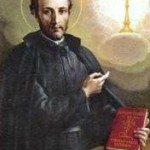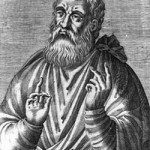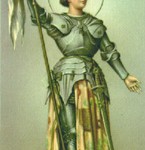In the year 1285, there died in the Cistercian monastery at TerDoest, near Bruges, a Norwegian bishop named Thorfinn. He had never attracted particular attention and was soon forgotten. But over fifty years later, in the course of some building operations, his tomb in the Church was opened and it was reported that the remains gave out a strong and pleasing spell. The Abbot made inquiries and found that one of his monks, and aged man named Walter de Muda, remembered Bishop Thorfinn staying in there monastery and the impression he had made of gentle goodness combined with strength. Father Walter had in fact, written a poem about him after his death and hung it up over his tomb. It was then found that the parchment was still there, none the worse for the passage of time. This was taken as a direction from on high that the Bishop’s memory was to be perpetuated, and Father Walter was instructed to write down his recollections of him. For all that, there is little enough known about St. Thorfinn. He was a Trondhjem man and perhaps was a Canon of the Cathedral of Nidaros, since there was such a one named Thorfinn among those who witnessed the agreement of Tonsborg in 1277. This was an agreement between King Magnus VI and the Archbishop of Nidaros confirming certain privileges of the clergy, the freedom of episcopal elections and similar matters. Some years later, King Eric repudiated this agreement, and a fierce dispute between Church and state ensued. Eventually the King outlawed the Archbishop, John, and his two chief supporters, Bishop Andrew of Oslow and Bishop Thorfinn of Hamar. Bishop Thorfinn, after many hardships, including shipwreck, made his way to the Abbey of TerDoest in Flanders, which had a number of contacts with the Norwegian Church. It is possible that he had been there before, and there is some reason to suppose he was himself a Cistercian of the Abbey of Tautra, near Nidaros. After a visit to Rome he went to TerDoest, in bad health. Indeed, though probably still a youngish man, he saw death approaching and so made his will; he had little to leave, but what there was, he divided between his mother, his brothers and sisters, and certain monasteries, churches and charities in his dioceses. He died shortly after on January 8, 1285. After his recall to the memory of man as mentioned in the opening paragraph of this notice, miracles were reported at his tomb and St. Thorfinn was venerated by the Cistercians and around Bruges. In our own day, his memory has been revived among the few Catholics of Norway, and his feast is observed in his episcopal city of Hamar. The tradition of Thorfinn’s holiness ultimately rests on the poem of Walter de Muda, where he appeared as a kind, patient, generous man, whose mild exterior covered a firm will against whatever he esteemed to be evil and ungodly. His feast day is January 8th.













